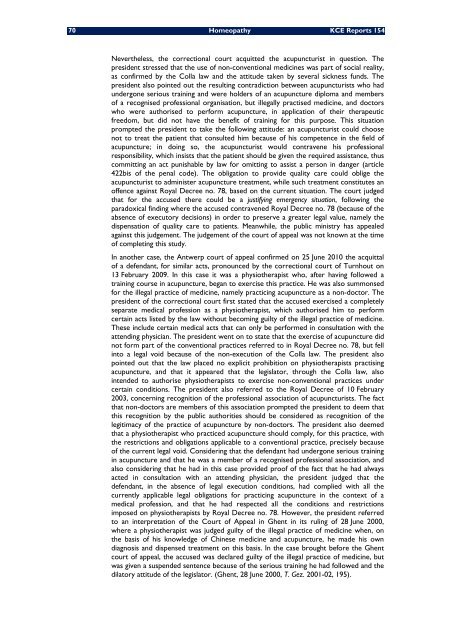Etat des lieux de l'homéopathie en Belgique - KCE
Etat des lieux de l'homéopathie en Belgique - KCE
Etat des lieux de l'homéopathie en Belgique - KCE
Create successful ePaper yourself
Turn your PDF publications into a flip-book with our unique Google optimized e-Paper software.
70 Homeopathy <strong>KCE</strong> Reports 154<br />
Nevertheless, the correctional court acquitted the acupuncturist in question. The<br />
presi<strong>de</strong>nt stressed that the use of non-conv<strong>en</strong>tional medicines was part of social reality,<br />
as confirmed by the Colla law and the attitu<strong>de</strong> tak<strong>en</strong> by several sickness funds. The<br />
presi<strong>de</strong>nt also pointed out the resulting contradiction betwe<strong>en</strong> acupuncturists who had<br />
un<strong>de</strong>rgone serious training and were hol<strong>de</strong>rs of an acupuncture diploma and members<br />
of a recognised professional organisation, but illegally practised medicine, and doctors<br />
who were authorised to perform acupuncture, in application of their therapeutic<br />
freedom, but did not have the b<strong>en</strong>efit of training for this purpose. This situation<br />
prompted the presi<strong>de</strong>nt to take the following attitu<strong>de</strong>: an acupuncturist could choose<br />
not to treat the pati<strong>en</strong>t that consulted him because of his compet<strong>en</strong>ce in the field of<br />
acupuncture; in doing so, the acupuncturist would contrav<strong>en</strong>e his professional<br />
responsibility, which insists that the pati<strong>en</strong>t should be giv<strong>en</strong> the required assistance, thus<br />
committing an act punishable by law for omitting to assist a person in danger (article<br />
422bis of the p<strong>en</strong>al co<strong>de</strong>). The obligation to provi<strong>de</strong> quality care could oblige the<br />
acupuncturist to administer acupuncture treatm<strong>en</strong>t, while such treatm<strong>en</strong>t constitutes an<br />
off<strong>en</strong>ce against Royal Decree no. 78, based on the curr<strong>en</strong>t situation. The court judged<br />
that for the accused there could be a justifying emerg<strong>en</strong>cy situation, following the<br />
paradoxical finding where the accused contrav<strong>en</strong>ed Royal Decree no. 78 (because of the<br />
abs<strong>en</strong>ce of executory <strong>de</strong>cisions) in or<strong>de</strong>r to preserve a greater legal value, namely the<br />
disp<strong>en</strong>sation of quality care to pati<strong>en</strong>ts. Meanwhile, the public ministry has appealed<br />
against this judgem<strong>en</strong>t. The judgem<strong>en</strong>t of the court of appeal was not known at the time<br />
of completing this study.<br />
In another case, the Antwerp court of appeal confirmed on 25 June 2010 the acquittal<br />
of a <strong>de</strong>f<strong>en</strong>dant, for similar acts, pronounced by the correctional court of Turnhout on<br />
13 February 2009. In this case it was a physiotherapist who, after having followed a<br />
training course in acupuncture, began to exercise this practice. He was also summonsed<br />
for the illegal practice of medicine, namely practicing acupuncture as a non-doctor. The<br />
presi<strong>de</strong>nt of the correctional court first stated that the accused exercised a completely<br />
separate medical profession as a physiotherapist, which authorised him to perform<br />
certain acts listed by the law without becoming guilty of the illegal practice of medicine.<br />
These inclu<strong>de</strong> certain medical acts that can only be performed in consultation with the<br />
att<strong>en</strong>ding physician. The presi<strong>de</strong>nt w<strong>en</strong>t on to state that the exercise of acupuncture did<br />
not form part of the conv<strong>en</strong>tional practices referred to in Royal Decree no. 78, but fell<br />
into a legal void because of the non-execution of the Colla law. The presi<strong>de</strong>nt also<br />
pointed out that the law placed no explicit prohibition on physiotherapists practising<br />
acupuncture, and that it appeared that the legislator, through the Colla law, also<br />
int<strong>en</strong><strong>de</strong>d to authorise physiotherapists to exercise non-conv<strong>en</strong>tional practices un<strong>de</strong>r<br />
certain conditions. The presi<strong>de</strong>nt also referred to the Royal Decree of 10 February<br />
2003, concerning recognition of the professional association of acupuncturists. The fact<br />
that non-doctors are members of this association prompted the presi<strong>de</strong>nt to <strong>de</strong>em that<br />
this recognition by the public authorities should be consi<strong>de</strong>red as recognition of the<br />
legitimacy of the practice of acupuncture by non-doctors. The presi<strong>de</strong>nt also <strong>de</strong>emed<br />
that a physiotherapist who practiced acupuncture should comply, for this practice, with<br />
the restrictions and obligations applicable to a conv<strong>en</strong>tional practice, precisely because<br />
of the curr<strong>en</strong>t legal void. Consi<strong>de</strong>ring that the <strong>de</strong>f<strong>en</strong>dant had un<strong>de</strong>rgone serious training<br />
in acupuncture and that he was a member of a recognised professional association, and<br />
also consi<strong>de</strong>ring that he had in this case provi<strong>de</strong>d proof of the fact that he had always<br />
acted in consultation with an att<strong>en</strong>ding physician, the presi<strong>de</strong>nt judged that the<br />
<strong>de</strong>f<strong>en</strong>dant, in the abs<strong>en</strong>ce of legal execution conditions, had complied with all the<br />
curr<strong>en</strong>tly applicable legal obligations for practicing acupuncture in the context of a<br />
medical profession, and that he had respected all the conditions and restrictions<br />
imposed on physiotherapists by Royal Decree no. 78. However, the presi<strong>de</strong>nt referred<br />
to an interpretation of the Court of Appeal in Gh<strong>en</strong>t in its ruling of 28 June 2000,<br />
where a physiotherapist was judged guilty of the illegal practice of medicine wh<strong>en</strong>, on<br />
the basis of his knowledge of Chinese medicine and acupuncture, he ma<strong>de</strong> his own<br />
diagnosis and disp<strong>en</strong>sed treatm<strong>en</strong>t on this basis. In the case brought before the Gh<strong>en</strong>t<br />
court of appeal, the accused was <strong>de</strong>clared guilty of the illegal practice of medicine, but<br />
was giv<strong>en</strong> a susp<strong>en</strong><strong>de</strong>d s<strong>en</strong>t<strong>en</strong>ce because of the serious training he had followed and the<br />
dilatory attitu<strong>de</strong> of the legislator. (Gh<strong>en</strong>t, 28 June 2000, T. Gez. 2001-02, 195).

















